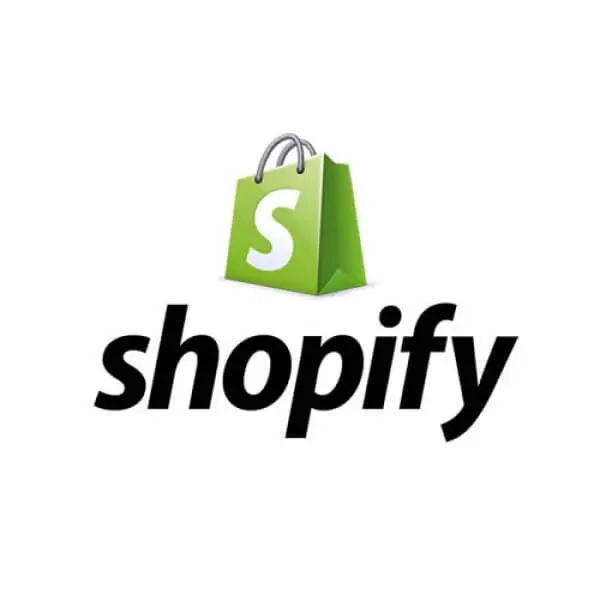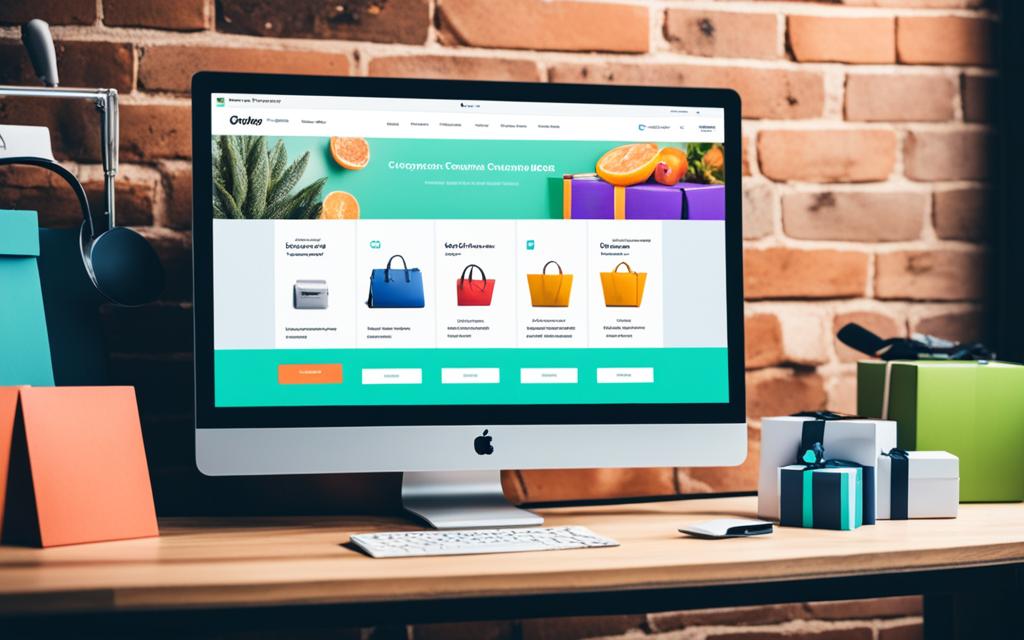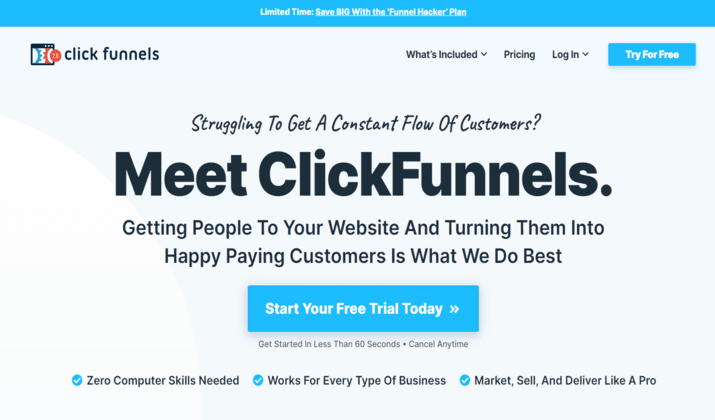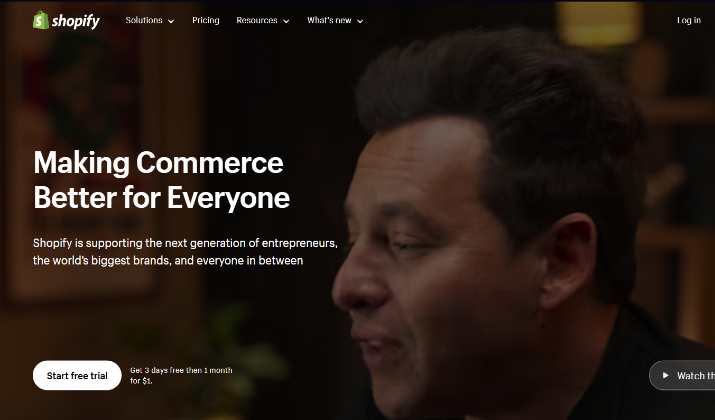ClickFunnels is a powerful sales and marketing platform that specializes in creating sophisticated sales funnels.
It focuses on lead generation, conversion optimization, and marketing automation for both digital and physical products.
ClickFunnels provides a seamless journey for potential customers, guiding them from the moment they land on your page to the point of purchase and beyond.
This makes it a valuable tool for businesses that want to construct easily optimized sales funnels to drive growth.
Unlike Clickfunnels, Shopify is basically an ecommerce platform designed for the construction and management of online stores.
It provides a user-friendly website builder, a secure shopping cart, payment gateway integration, inventory management, and various marketing and SEO tools.
These comprehensive features make Shopify a popular choice for businesses of all sizes looking to establish an online presence and sell products or services.
Try Shopify free followed by first month at just $1. No credit card required. Limited Time Offer.
The main distinction between ClickFunnels and Shopify lies in their respective focuses.
ClickFunnels specializes in marketing and promotion through sales funnels, offering ClickFunnels features, sales funnel builder, and a range of online business tools to optimize the customer journey.
In contrast, Shopify is centered on building and managing an ecommerce store, excelling in areas such as inventory management, shipping, and customer relationship management.
Let’s learn more on what each of these offers.
Sales Funnel Capabilities
When it comes to lead generation and conversion, ClickFunnels stands out due to its focus on sales funnel optimization.
Its funnel templates and optimization features make it a powerful tool for businesses looking to capture high-quality leads and convert them into customers.
While Shopify provides conversion tools like upsells, order bumps, and abandoned checkout nudges, its primary focus is not on frictionless lead generation and conversion.
Lead Generation & Conversion
ClickFunnels’ specialization in sales funnel optimization gives it a distinct advantage when it comes to lead generation and conversion.
Its pre-built funnel templates and advanced optimization features help businesses streamline the customer journey, from initial interest to final purchase.
This makes ClickFunnels an excellent choice for entrepreneurs, small businesses, and organizations focused on maximizing their online marketing efforts and driving high-quality leads through the sales funnel.
Also Read: Systeme vs ClickFunnels vs Stan Store
Marketing Tools & Automation
In terms of marketing tools and automation, both ClickFunnels and Shopify offer robust capabilities.
ClickFunnels provides a comprehensive suite of marketing features, including affiliate management, CRM integration, social media marketing tools, content management, video hosting, webinar funnels, and advanced reporting and analytics.
Shopify emphasizes selling through social media ads, offering a straightforward integration with leading social media platforms to generate traffic for ecommerce stores.
While both platforms have their strengths in the marketing realm, ClickFunnels stands out with its focus on sales funnel optimization and email marketing automation.
Check Out: Systeme vs Builderall vs ClickFunnels
Ecommerce Store Management
When it comes to Shopify product management and ClickFunnels inventory, both platforms offer distinct features for your ecommerce store.
Product Catalog & Inventory
Shopify provides a more comprehensive set of product catalog and inventory management tools, including inventory tracking, product information management, stock alerts, variants and options, barcode scanning, bulk editing, and product categorization.
This makes Shopify a better choice for businesses with large-scale online stores or those selling physical products.
In contrast, while ClickFunnels does include some product catalog and inventory management features, it is not as extensive as Shopify’s offerings.
If you have a large or complex product catalog, Shopify’s comprehensive inventory management system may be the better fit for your needs.
Try Shopify free followed by first month at just $1. No credit card required. Limited Time Offer.
Shipping & Fulfillment
Shopify has a clear advantage over ClickFunnels. Shopify offers seamless integrations with major shipping carriers like DHL, USPS, and UPS, allowing you to take advantage of discounted shipping rates and streamlined order fulfillment.
Shopify also provides tools for managing inventory, tracking shipments, and offering various shipping options to your customers.
Whereas, ClickFunnels does not have as robust of a shipping and fulfillment ecosystem, making Shopify the better choice if you are selling physical products that require comprehensive shipping and logistics management.
Also Read: Shopify vs Shoptet
Integrations & Extensibility
When it comes to payment processing and gateway options, both ClickFunnels and Shopify offer a wide range of choices.
ClickFunnels integrates with popular payment processors like PayPal and Stripe, allowing you to accept various payment methods from your customers.
Shopify also provides a comprehensive array of payment gateway integrations, in addition to offering its own Shopify Payments platform.
Both ClickFunnels and Shopify have robust app and plugin ecosystems that enable you to extend the functionality of their respective platforms.
ClickFunnels offers a variety of built-in features and integrations. Shopify, on the other hand, boasts an extensive with thousands of apps covering a wide range of ecommerce needs, from marketing and customer engagement to inventory management and shipping.
Everyday Use for Web Admins
User Friendliness & Learning Curve
The choice between ClickFunnels and Shopify will depend on the web admin’s familiarity with online marketing and their specific business needs.
ClickFunnels, with its focus on sales funnels, may require more upfront investment in understanding the platform’s features and functionalities.
Shopify, on the other hand, is often more intuitive for those looking to quickly establish and start selling products or services online.
Try Shopify free followed by first month at just $1. No credit card required. Limited Time Offer.
Tech Support & Uptime
When it comes to and, Shopify has a clear advantage. Shopify offers around-the-clock customer support via phone, email, and chat, ensuring that web admins can quickly resolve any issues that arise.
ClickFunnels provides more limited support, primarily through email and chat during regular business hours.
Additionally, Shopify’s platform has a proven track record of high uptime and reliability, which is crucial for maintaining a seamless customer experience and avoiding any disruptions to online sales.
Also Read: Shopify vs Storyblok
Pricing & Plans
When it comes to ClickFunnels and Shopify, the pricing and subscription plans are an important consideration for businesses.
Let’s take a closer look at what each platform offers.
ClickFunnels Pricing
ClickFunnels offers three pricing plans that are billed annually. These are:
- Basic – Starts at $127 per month and includes features like one website, up to 20 funnels, three users, and 10,000 contacts.
- Pro – Costs $157 per month, upgrades the features to one website with up to 100 funnels, five users, and 25,000 contacts. Suitable for businesses that require advanced functionality.
- Funnel Hacker – Priced at $208 per month and provides three websites with unlimited funnels, 15 users, and 200,000 contacts.
While ClickFunnels’ pricing may be more expensive than some other marketing software costs, the comprehensive sales funnel optimization tools and features it provides can deliver significant value for businesses focused on lead generation and conversion.
Explore: Systeme vs Shopify
Shopify Pricing
Shopify offers three main pricing plans, all of which include a three-month $1 trial period.
- Basic – Starts at $29 per month
- Shopify – Costs $79 per month
- Advanced – $299 per month
- Plus – $2300 per month
The plans differ in terms of features such as the number of staff accounts, credit card processing rates, reporting capabilities, and shipping discounts.
Try Shopify free followed by first month at just $1. No credit card required. Limited Time Offer.
While Shopify’s pricing is generally more affordable than ClickFunnels, businesses should also consider the potential costs of third-party apps and integrations that may be necessary to extend Shopify’s functionality to meet their specific needs.
Check Out: Hostinger vs Shopify
When to Choose ClickFunnels?
If your business is focused on driving high-quality leads, optimizing conversion rates, and automating your marketing efforts, ClickFunnels could be the ideal platform.
Its sales funnel templates, lead capture tools, and marketing automation features can help you guide potential customers through a streamlined sales process, from the initial point of contact to the final purchase.
ClickFunnels is particularly useful for businesses with a limited number of products or services, as it allows you to create a laser-focused sales experience that resonates with your target audience.
Explore: Shopify vs Dukaan
When to Choose Shopify?
Shopify is the preferred choice for businesses that need a comprehensive ecommerce platform to build and manage their online store.
Shopify’s strengths are in its robust product catalog and inventory management, shipping and fulfillment tools, and extensive app ecosystem.
It is an excellent platform for businesses selling physical products, offering a wide range of features to support the entire ecommerce lifecycle, from product listing to order processing and customer service.
Shopify is particularly well-suited for businesses with a large product catalog, complex shipping needs, or those focused on building a strong online retail presence.














